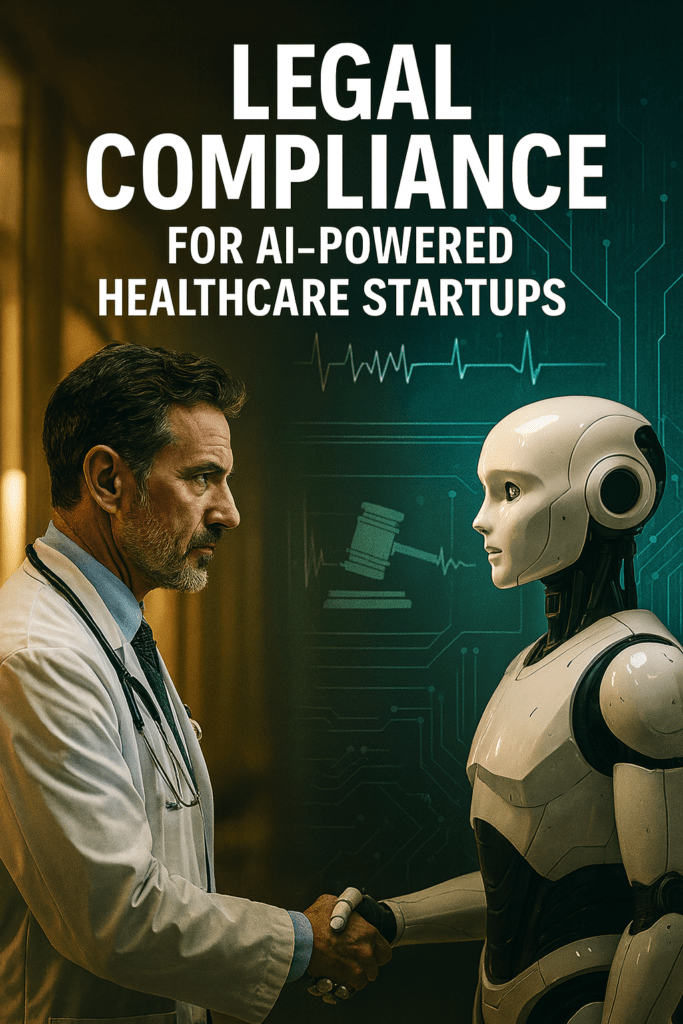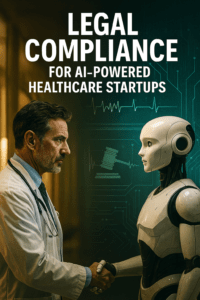Artificial intelligence is transforming healthcare, from diagnostic tools to mental health chatbots to personalized treatment engines. For startups building in this high-growth sector, the opportunity is massive, but so are the legal risks.
This guide explains the most pressing healthcare startup law issues founders must understand to protect their product, secure funding, and stay compliant.
What Are the Key Legal Risks for Healthcare Startups Using AI?
Healthcare startups face overlapping regulatory regimes. The key areas of exposure include:
- HIPAA compliance for any startup dealing with protected health information (PHI)
- FDA regulation if your product makes medical claims or functions as a diagnostic device
- Biometric data laws (like Illinois BIPA or California’s CPRA)
- Intellectual property (IP) ownership, especially for AI-generated outputs or models
- Liability exposure if your AI tool gives bad advice or is used improperly
Each of these requires a separate legal strategy tailored to your business model, funding stage, and target users.
Is My Healthcare AI Startup Subject to HIPAA?
If your startup is a “covered entity” or “business associate” under HIPAA, you are subject to strict privacy and security rules. Even if you’re not directly covered, you may be contractually required to comply via BAAs (Business Associate Agreements) with your partners.
If your app stores, transmits, or analyzes PHI—names, diagnoses, treatment records—HIPAA probably applies. Noncompliance can lead to six-figure fines and kill investor confidence.
Tip: Don’t guess. Do a legal HIPAA applicability review early in development.
What About FDA Regulation for AI Products?
The FDA increasingly regulates software as a medical device (SaMD), especially if your product:
- Makes predictions about a disease
- Diagnoses or screens symptoms
- Recommends treatment paths
Not every health app is a medical device—but if your AI crosses that line, you need regulatory counsel. Some tools can qualify for streamlined pathways, but others require full approval.
Also, if your product is trained on third-party medical data, there may be additional FDA scrutiny.
Can I Protect My AI Startup’s IP?
Many healthcare startups assume their algorithms or training data are automatically protected. That’s a mistake.
In most cases, AI code is copyrightable (as software), but AI-generated outputs are not. If you’re using AI to generate diagnostics or research insights, you need an IP strategy that includes:
- Strong confidentiality and trade secret controls
- Copyright registration for your training and inference code
- License reviews for open-source components
- Employee and contractor IP assignment agreements
Failure to properly assign IP at the start can cost founders dearly during due diligence.
 What Are the Top Startup Legal Mistakes in Healthcare AI?
What Are the Top Startup Legal Mistakes in Healthcare AI?
Some of the most common (and costly) legal mistakes include:
- Misclassifying data under HIPAA or assuming you’re exempt
- Skipping FDA review based on a flawed legal interpretation
- Using unlicensed datasets in training
- Failing to register trademarks for brand assets
- Neglecting founder equity agreements, which derails future funding
Each of these issues has led to investor pullouts or litigation for other startups in the sector.
Do Healthcare Startups Need a Custom Terms of Use and Privacy Policy?
Yes—and templates won’t cut it.
Your startup needs tailored terms that cover:
- User obligations
- Disclaimers of medical advice
- AI transparency
- Data sharing and opt-in disclosures
- Jurisdiction and arbitration clauses
For consumer-facing apps, your privacy policy must also address CPRA, HIPAA, and biometric data rules. A standard SaaS policy from the internet won’t cover you.
How Should I Structure My Healthcare Startup Legally?
Most founders choose a Delaware C-Corp for fundraising and IP protection. But beyond entity choice, consider:
- Having clear equity splits and vesting schedules for founders and advisors
- Inserting IP assignment clauses in early contracts
- Avoiding co-development agreements with hospitals unless fully reviewed
- Planning for clinical trial liability if applicable
Even early-stage MVPs can trigger liability without the right agreements.
What Should I Include in a Pitch Deck or VC Due Diligence Packet?
Sophisticated healthcare investors now expect a legal roadmap. Be prepared to show:
- HIPAA applicability memo
- FDA classification opinion (if relevant)
- Trademark and IP registrations
- Custom privacy policy & terms
- Equity cap table and founder agreements
If you’re missing these, your valuation could drop—or the deal could fall through.
Build Your Healthcare Startup on a Strong Legal Foundation
AI-powered healthcare is one of the most promising—and legally complex—startup categories in 2025. Founders who understand healthcare startup law and invest in the right legal infrastructure early on will outpace those who don’t.
Legal compliance is not a barrier. It’s a launchpad.
David Nima Sharifi, Esq., founder of the L.A. Tech and Media Law Firm, is a nationally recognized IP and technology attorney with decades of experience in M&A transactions, startup structuring, and high-stakes intellectual property protection, focused on digital assets and tech innovation. Quoted in the Wall Street Journal and recognized among the Top 30 New Media and E-Commerce Attorneys by the Los Angeles Business Journal, David regularly advises founders, investors, and acquirers on the legal infrastructure of innovation.
Schedule your confidential consultation now by visiting L.A. Tech and Media Law Firm or using our secure contact form.



